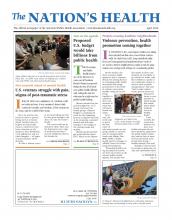Infection prevention
The Association for Professionals in Infection Control and Epidemiology in January launched a redesigned website at www.apic.org. The new site offers a range of enhancements to help health professionals and consumers obtain up-to-date information on infection prevention and control.
Complementary health
The National Center for Complementary and Alternative Medicine at the National Institutes of Health in March launched a new series of monthly health tips. Online at www.nccam.nih.gov/timetotalk, “Time to Talk Tips” provides consumers with easy-to-read information on complementary health practices.
Health and wellness
Columbia University in January debuted an updated version of its “Go Ask Alice!” website. The resource, online at www.goaskalice.columbia.edu, maintains its format as an anonymous question and answer site, answering reader-generated questions ranging from acne to X-rays, but further engages users by enabling readers to rate or comment on any of the thousands of questions found in six broad health categories: alcohol and other drugs, emotional health, general health, nutrition and physical activity, relationships, and sexual and reproductive health.
Kidney disease
The National Institutes of Health’s National Kidney Disease Education Program in January launched a new series of free tools and resources to help community groups increase awareness about steps to prevent kidney disease or improve management of kidney disease. Online at www.nkdep.nih.gov/about/getinvolved, the resource provides a set of free educational materials to health care providers and communities.
Occupational health
The Occupational Safety and Health Administration in December launched an online resource to help protect workers from hazards they may face during winter storm response and recovery operations. Online at http://s.dol.gov/L1, the resource provides guidance on how employers and workers involved in cleanup and recovery operations can recognize snow storm-related hazards and the necessary steps that employers must take to keep workers safe.
Tobacco control
University of Iowa law professor Marc Linder, JD, PhD, MA, in February announced the release of his book, “Inherently Bad, and Bad Only.” Available free at http://ir.uiowa.edu/cgi/viewcontent.cgi?article=1001&context=books, the web-based book provides a history of state-level regulation of cigarettes and smoking in the United States since the 1880s.
PCBs
The Center for Health, Environment and Justice in February released a Web page and fact sheets to educate the public about polychlorinated biphenyls, or PCBs, in schools. Online at http://chej.org/campaigns/childproofing/projects/pcbs-in-schools/no-pcbs-pic, the resource features information about the health effects of PCBs, a group of human-made chemicals widely used in fluorescent lights, insulation and a range of other products prior to 1977.
Senior health
The American Medical Association and AARP in January released “Team Up to Stay Healthy.” The new brochure helps seniors learn about and receive the preventive services now covered by Medicare. Offered in English and Spanish and online at http://www.ama-assn.org/ama/pub/physician-resources/public-health/promoting-healthy-lifestyles/geriatric-health/patient-preventive-services-brochure.page, the brochure provides information to help patients prepare for their physician visits and explains what to expect, what to bring and what to ask their physician.
- Copyright The Nation’s Health, American Public Health Association









